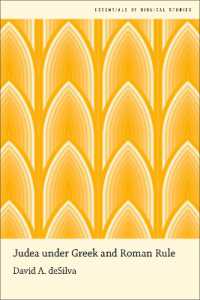- ホーム
- > 洋書
- > 英文書
- > Psychology
Full Description
Karl Abraham: Life and Work, a Biography is the first complete biography of Karl Abraham (1877-1925), a close colleague and friend of Sigmund Freud and one of the most important pioneers of psychoanalysis. Abraham was the first psychoanalyst in Germany, where he brought about a great flourishing of psychoanalysis. His clinical-theoretical contributions quickly became classics that have powerfully influenced the development of psychoanalytic theory. He was the first to develop a psychoanalytic theory of depression, several years before the publication of Freud's 'Mourning and Melancholia'. Abraham was both supervisor and analyst to Melanie Klein, on whose theoretical work he had a profound influence.In the 1920s Abraham was the most important analyst of the psychoanalytic movement after Freud. He was president of the International Psychoanalytical Association, president of the Berlin Psychoanalytic Society, and a member of the "secret committee". He was involved in a number of major conflicts of the early years of psychoanalysis, and after his death he was quite often blamed for them. As a consequence, Abraham, so highly valued during his life, was frequently reviled after his death.
Contents
Series Editor's Foreword -- Introduction -- Childhood in Bremen -- Student years -- Doctor's assistant in Dalldorf -- Burghölzli -- The first meetings between Freud and staff from the Burghölzli Clinic -- A private practice and the first psychoanalytic conflict -- Psychoanalysis in Berlin -- Segantini and depression -- A meeting with Fließ, family life, and the failed Habilitation -- Akhenaten -- The secret committee -- An unhappy writer, scopophilia, and other peculiarities -- The First World War -- A great turnaround -- Creation of a theory about early childhood and ejaculatio praecox -- The final war years in Allenstein -- The congress in Budapest of 1918 -- Germany in chaos, yet the creation of a psychoanalytic polyclinic in Berlin goes ahead -- The congress in The Hague from 8 to 11 September 1920 -- The issue of lay analysis and Abraham in a tight corner -- Psychoanalysis flourishes in Berlin -- Unrest in Germany and a successful congress in Berlin -- Young talent pours in -- Psychoanalytic techniques and Helene Deutsch -- Innovative work -- The conflict surrounding Rank and the disintegration of the committee -- Melanie Klein and fellow analysands -- Abraham's death -- Upheaval -- Afterword -- Sources -- Interviews







